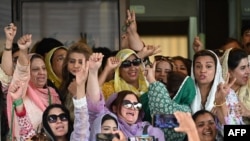In a much-awaited decision Friday, Pakistan's top court declared former Prime Minister Imran Khan's party was entitled to its share of reserved seats in the national and provincial assemblies, handing the incarcerated leader's supporters a major legal victory.
The 8-5 decision, broadcast live, overturned an earlier verdict of the Election Commission of Pakistan, and backed by a provisional court, that deprived Pakistan Tehreek-e-Insaf, or PTI, of close to 80 reserved seats in the national and provincial legislatures.
The decision that will see more than 20 seats in the National Assembly go to PTI deprives Prime Minister Shehbaz Sharif's ruling coalition of a two-thirds majority. However, with more than 200 seats in hand it will retain a majority required to rule in the body of 336.
PTI leaders hailed the victory, calling it a golden day in Pakistan's history.
"It is a day of joy for supporters in and outside Pakistan. We finally got our right," PTI Chairman Gohar Ali Khan told media outside the court.
The court's short order affecting the makeup of national and provincial assemblies comes five months after Pakistan went to the polls on February 8. The election that saw PTI-backed candidates win the largest number of seats in the National Assembly, the lower house of the country's bicameral parliament, faced widespread allegations of pre-poll rigging and result manipulation.
The election commission and Sharif's ruling coalition have rejected foreign calls to investigate alleged electoral discrepancies. Addressing a press conference soon after the verdict came, Law Minister Azam Nazeer Tarar told media the decision was painful.
"It's painful that apparently the articles of the constitution were not interpreted but rewritten," Tarar said.
He said repealing the verdict would be the Cabinet's decision.
Background
According to Pakistan's elections laws, seats reserved for women and non-Muslims are allotted to parties in proportion to the number of seats they win in the general elections.
PTI was forced to run candidates as independents in the February 8 polls after the country's top court upheld the election commission's decision to strip it of a unified electoral symbol. The election commission took away the party's symbol after it declared PTI's intraparty elections invalid.
PTI candidates still won 93 seats in the National Assembly, leaving behind Sharif's Pakistan Muslim League-Nawaz and Pakistan Peoples Party of the Bhutto dynasty.
To maintain a unified presence in the legislature, PTI-backed candidates joined the Sunni Ittehad Council, or SIC, making the right-wing religious party the parliamentary face of PTI.
However, the election commission rejected SIC's claim to reserved seats in March, citing technicalities, including that it did not submit a list of names for reserved seats before the election. The ECP then doled out reserved seats to other parties boosting PTI's opponents' position across national and provincial legislatures.
Later the same month, the Peshawar High Court upheld the election commission's decision.
In May, however, the Supreme Court suspended those verdicts, putting the ruling alliance's two-thirds majority on hold and the status of several lawmakers occupying reserved seats in limbo.
Overturning the election commission and provincial court's decisions on Friday, the top court's majority declared PTI did not lose its status as a political party in the assemblies despite losing its electoral symbol prior to polls and running candidates as independents.
The court asked PTI-backed lawmakers to declare their party affiliation with the commission. It ordered the commission to allot the party its share of reserved seats across all legislatures.




